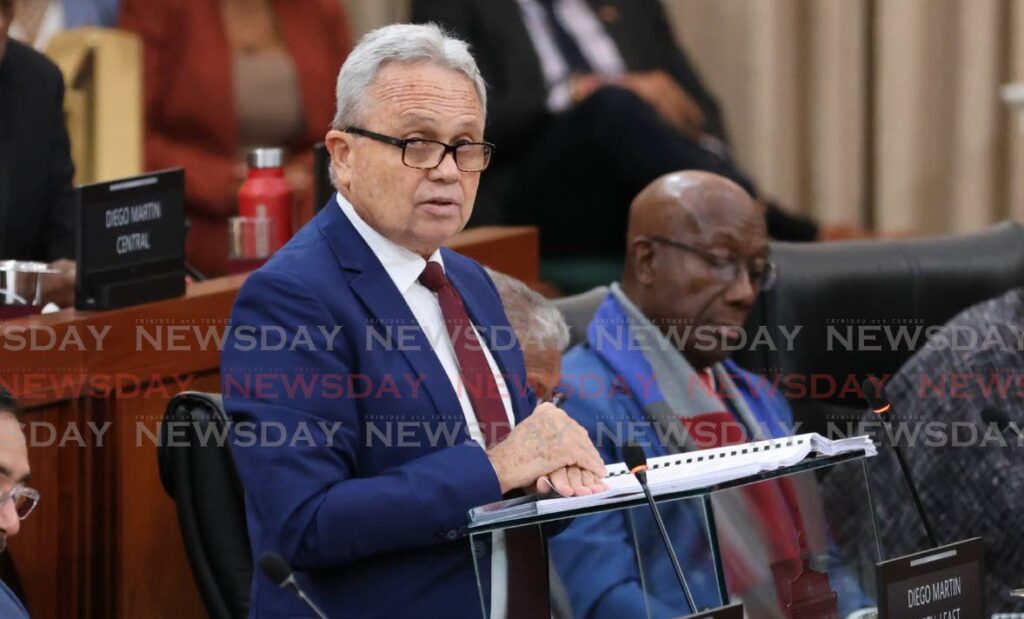Imbert: Let energy companies pay 100% in US$

FINANCE Minister Colm Imbert wants to encourage energy firms to pay the country for their products fully in US dollars, not just 50 per cent as now obtains, he told the Senate as he piloted the budget on October 21.
"There is a nuance I intend to deal with in fiscal 2025."
He said that even though all energy exports from TT were sold internationally for US dollars, he had done a detailed analysis and learnt that only 50 per cent of the money paid to TT was in the form of US dollars, with the other 50 per cent paid in TT dollars.
"This is despite the fact that 100 per cent of the exports of oil, (natural) gas and petrochemicals are (paid) in US dollars.
"So it is something we need to deal with."
Imbert hoped to get a greater inflow of US dollars coming into the Treasury to boost TT's foreign reserves.
"There are many questions as to why (despite) being an oil-producing country, we have difficulty with our foreign reserves. This is the reason why. The energy sector companies do not pay all their taxes in US dollars, it was just thought it was so."
He said he did a detailed analysis a few months ago and made the discovery.
"I would encourage energy companies to pay all in US dollars," he said.
Imbert announced more tax breaks in the sectors of agriculture and health.
Firstly, he said while much of the agriculture sector was now tax-free, certain lacunae or gaps exist. He promised to soon sit down with Agriculture Minister Kazim Hosein and Minister in the Ministry of Agriculture Avinash Singh to remove any ambiguities to make the sector fully tax-free.
Secondly, he also said that under the rubric of health, he would exempt all sporting equipment from tax. However, he said the tax exemption would not apply to sports clothing as he said items like sneakers could be bought and used as fashion items.
Imbert said this will be the last time the Government has a tax amnesty. He said the Revenue Authority comes into effect in 2025.
The minister made a plug for electric cars (whose charging devices will become tax-exempt), revealing he had just bought such a vehicle by which he had driven to Blanchisseuse for one-tenth the cost of petroleum.
Generally, Imbert touted the strengths of the TT economy although also saying the country was now in a difficult place.
The Heritage and Stabilisation Fund has rebounded from US$4.7 billion in 2022 to US$6.1 billion now, due to prudent management he said.
Imbert touted three years of economic growth for TT, namely 1.5 per cent in 2022, 1.3 per cent in 2023 and a projected 1.9 per cent in 2024.
He hailed a recent 28 per cent increase across three sub-sectors, namely accommodation and food services, trade and repair, and transportation and storage. He expected a boost in tourism, citing a 91 per cent hike or near doubling of cruise-ship passenger arrivals in the 2023-2024 season.
As an aside, he pondered what he termed the current low level of global oil prices. He had predicated his budget on oil at US$77.80 per barrel of crude, but the latest prices at the website were US$70.56 (WTI) and US$74.13 (Brent).
He surmised that despite current tensions in the Middle East, the US has large stockpiles of oil which it is releasing onto the market to keep prices down.
Imbert said TT was currently in "a very difficult situation" economically but despite that has not increased taxes and has still kept paying every public servant.

Comments
"Imbert: Let energy companies pay 100% in US$"